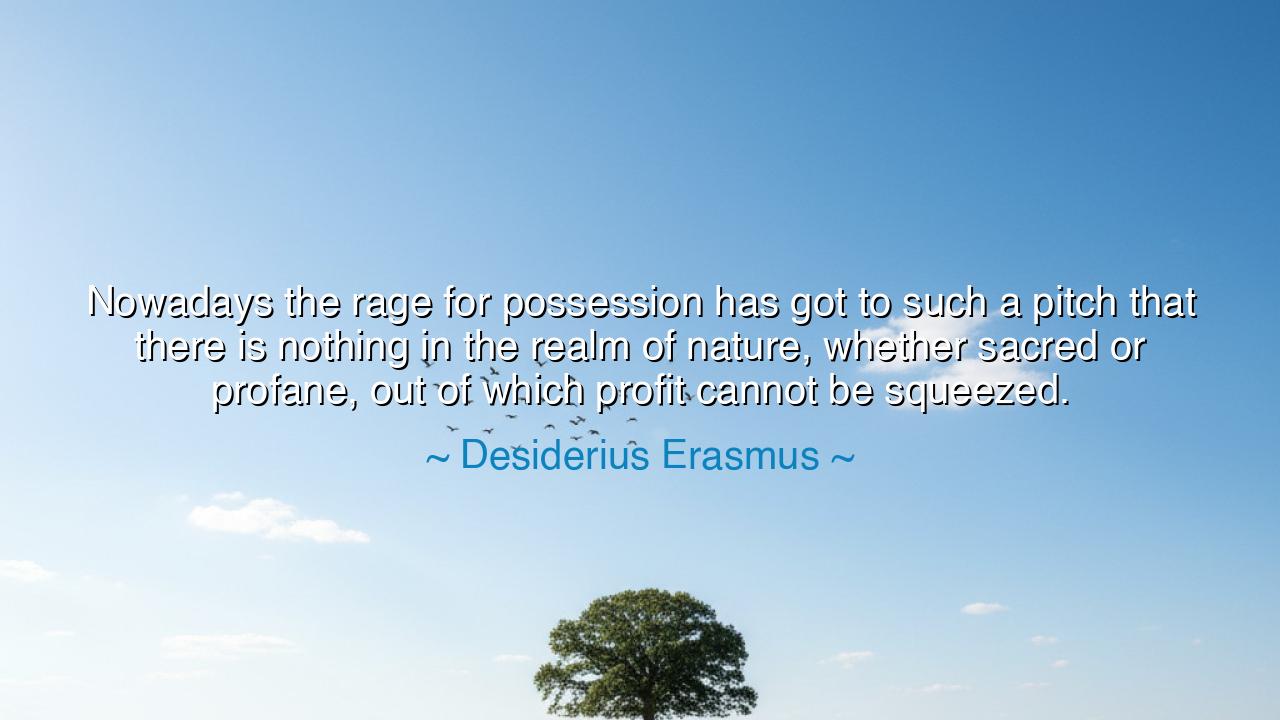
Nowadays the rage for possession has got to such a pitch that
Nowadays the rage for possession has got to such a pitch that there is nothing in the realm of nature, whether sacred or profane, out of which profit cannot be squeezed.






"Nowadays the rage for possession has got to such a pitch that there is nothing in the realm of nature, whether sacred or profane, out of which profit cannot be squeezed." Thus wrote Desiderius Erasmus, scholar of the Renaissance, whose keen eyes pierced the follies of men and exposed the sickness of greed. In these words, he speaks of a fire that consumes the human heart—the endless thirst for possession, the restless hunger to make every stone, every tree, every fragment of the world a thing to be owned, bought, and sold. His lament, though uttered centuries ago, echoes still in our own age, for the spirit of profit has not lessened, but grown even more insatiable.
The rage for possession is not new, but ancient. From the days when tribes clashed over fertile valleys to the age of empires that carved the earth into dominions, man has sought to hold in his grasp what was never truly his. Yet Erasmus reveals something deeper: that this lust is not only for gold or land, but for all things—sacred or profane, holy relics or common earth. Even what belongs to the realm of spirit is seized by greedy hands and bartered as though divinity itself were merchandise. The temple, the scripture, the image of the saint—all became in his time a market. And do we not see the same now, when the wonders of creation are commodified, and the very breath of the earth is turned into coin?
History offers us countless mirrors of this truth. Recall the tale of the Enclosure Movement in England, when common fields that once fed the poor were fenced off by the rich. Land, which had been shared for generations, was seized, measured, and sold. Families who had lived freely from the bounty of the soil were cast into poverty, while wealth multiplied in the hands of the few. What Erasmus warned against was manifest: the transformation of nature itself into profit, the sacred rhythms of life bent to the yoke of possession. The rage had reached a pitch where even the poor man’s bread was swallowed by the greed of others.
The words of Erasmus rise also as a warning to our own times. Look upon the seas, plundered until the fish grow scarce. Look upon the forests, felled for gain though the air itself grows thin. Look upon the digital realm, where even thoughts, images, and memories are bought and sold. Indeed, "there is nothing in the realm of nature" that escapes the hunger of possession. Even silence, even solitude, even the sacred rest of the human soul is turned into commodity. The truth Erasmus saw with dread is now a truth we breathe daily.
Yet we must not despair, for the quote does more than condemn—it calls us to awaken. For if the sickness of possession lies in the heart, then the healing too must begin there. We must learn again to see the world not as a warehouse of resources, but as a living temple. The sacred cannot be sold, nor the profane be exhausted, if we look upon them with reverence instead of hunger. It is not that we must refuse all use of the earth, but that we must remember we are stewards, not masters; caretakers, not tyrants.
The lesson is plain: resist the rage for possession. Begin small. Use less, and cherish more. Share what you have instead of clutching it. Honor the natural world by protecting it, not plundering it. Seek in others not what you can take, but what you can give. For the one who possesses everything is never satisfied, but the one who reveres the sacred in all things is already rich beyond measure.
Therefore, beloved listener, take the wisdom of Erasmus as a torch. Let it burn away the shadows of greed in your own soul. Do not join the marketplace that seeks to turn every leaf and every drop of rain into currency. Instead, join the brotherhood of those who guard the sacred, who find joy in simplicity, who know that the true wealth of life lies not in profit, but in peace, in reverence, and in the unmeasured abundance of a world freely given. Only then will the rage for possession be calmed, and the earth herself, long plundered, begin to heal.






AAdministratorAdministrator
Welcome, honored guests. Please leave a comment, we will respond soon